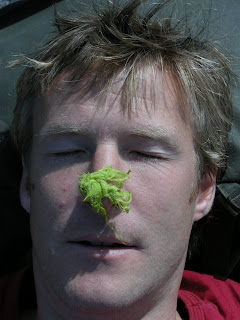
We decided to do some WWOOFing around Scandinavia, something we have both wanted to do for a long time. WWOOFing (Willing Workers on Organic Farms) means volunteering our services to organic farms in return for learning some skills and being provided a place to sleep and home grown food. And of course staying on a farm with locals means you learn a lot more about the country.

Jaana and Jari run an organic farm in Finnish Lapland, just north of the Arctic Circle. Jari's family has been farming reindeer here for generations and the village of Tapionkyla is full of his relatives (including his 85 year-old aunty, the multiple times ski and reindeer sled champion of Scandinavia).

A house without a sauna would be inconcieveable to a Fin, and a quick dip in a lake North of the Arctic circle isn't as bad as you would think!! In common with Belarus the mention of a sauna is quickly followed by the mention of vodka!
 The Finnish women show us how it is done!!
The Finnish women show us how it is done!!
On the farm they also grow vegetables, have several hay fields, horses and quite a few dogs including this one - a real elk-dog (no, not the result of an unlikely union between dog and elk but a dog that instinctively sniffs out elk and barks when he finds one - they just cant get enough elk!) .
 Every car in Finland has a dog and a toilet in the back.
Every car in Finland has a dog and a toilet in the back. The least drunk people get to drive home.
The least drunk people get to drive home.

Lapland is home to the Saami people who have herded riendeer here for hundreds of years. They are fiercely proud, and rightly so, of their beautiful clothes made from blue cloth and reindeer skins.


The reindeer are very wild and are only brought in for the winter. Once a year, the reindeer are herded by all the local residents. Young animals are given a distinctive ear-mark to show who owns them and remarkably they all end up in the right place in the end.




The forest around goes on and on for miles. It's a real wilderness (despite some slightly questionable forestry by the Finnish government) and a very peaceful place. Elk live here (moose in shamerican). This is the land of the Midnight Sun and we were very happily walking around the forest in the middle of the night, when there's less mosquitos to bother you. This also means that winter is very dark and much of the work bringing in reindeer and hunting for the winter must be done quickly before the sun sets for the last time that year! The berry is arguably the best in the world (??!) its a cloudberry mmmmmmmmmmmmm.

 We tried to go horseriding but picked the fastest horse in the world and the slowest horse in the world so had to communicate with flags.
We tried to go horseriding but picked the fastest horse in the world and the slowest horse in the world so had to communicate with flags.
 After a fantstic week at their farm we hitched north to Kilpisjarvi, on the border between Finland, Norway and Sweden.
After a fantstic week at their farm we hitched north to Kilpisjarvi, on the border between Finland, Norway and Sweden. Arriving at the Finnish/Norwegian border
Arriving at the Finnish/Norwegian border
There we saw the first mountains we had encountered in a long time and climbed the nearest one at midnight, looking across to Norway where we would head the next day.
It was a beautiful warm night and the clouds slowly crept into the valleys like big fluffy rivers:




































